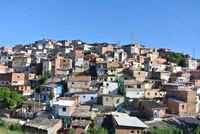From heroes to villains: Brazil at risk of moving away from the New Urban Agenda
A network of Brazilian civil society organisations is calling the international community to support their mobilisations against a new presidential act that intends to dismantle the regulations for land regularization in Brazil. Since the introduction of the City Statute in 2001, Brazilian urban policy has been setting a series of innovative precedents in the implementation of principles of Right to the City. The Statute involves the recognition of the social function of property, setting the framework for participatory urban planning as well as linking land tenure regularization with urbanization of settlements.
Since then, this law has been consolidated as a legal guide for the Brazilian land regularization policy and several other statutes were enacted guided by its principles in order to regulate instruments and procedures (Law n.11977/09 about urban settlements regularization; Law n. 11481/07 about regularization on public owned land; Law 11952/09 about regularization on land owned by the Federal Government in the Amazon Region). This legal framework became an international example of progressive urban policy, prioritizing justice over profit, and informing the development of the United Nations’ New Urban Agenda agreed in 2016
The Provisional Presidential Act (PPA) no. 759/16 enacted at the very end of 2016 attempts to amend the existing legislation regarding land regularization with an act that promises to reduce bureaucracy and increase efficiency. However, its underlying motivation is to reposition land as a financial asset, rather than a right. Apart from dismantling an entire legal body that represents the result of a long term public debate and consolidated collective understanding and agreement of multiple stake-holders, the PPA marks a step backwards in terms of assuring access to land for the poor and implementing the principle of social function of property. Below are some of the problems with the PPA.
– Changing basic principles: legal definition of land regularization established by the PPA suppresses the aim to assure housing rights and environmentally sustainable by observing the social function of property. According to the new law, policies on land regularization are to be economically sustainable and developed based on principles of competitiveness and efficiency.
– Lack of participation: participation is no longer a principle of land regularization. Furthermore, the PPA revokes a consolidated and democratic legal framework replacing it with a not self-operating law enacted without any public debate.
– Massive privatization of land owned by the Federal Government: the new law creates an instrument that gives property rights indiscriminately, without meeting any criteria regarding social and collective interest. The PPA makes possible and easier to regularize high-income settlements and gated communities in public land without any compensation at a loss of social and environmental function of public property.
– Amnesty to deforestation and land appropriation: the PPA allows regularization of large parcels of public land all over the country even to those who already own land. It accepts deforestation as proof of possession,substantially changing the program “Legal land in the Amazon Region” originally conceived to settle conflicts over landbetween small-scale agriculture and traditional population against agribusiness, preventing deforestation.
– Policy on Rural Reform weakened: according to this new law,land titles resulting from rural reform can be sold in the market,increasing the risk toreturn to a situation of land concentration. Furthermore, the governmental agency on rural reform is released from its obligations regarding the wellbeing of settled families and looses competencies to a Secretary that answers directly to the President.
– Land regularization for social interest weakened: in the PPA, special social interest zones no longer exist.This results in the loss of an important zoning instrument that for a long time was used to demarcate urban territory occupied by the poor, setting priority fortenure regularization. This and other tools and procedures that made it easier to regularize informal settlements occupied by the poor are no longer in place.
In brief, the PPA focuses on property titles not in assuring basic human rights to those more in need. This new law deconstructs an innovative legal framework based on pillars of participatory urban planning socio-environmental function of the city and property and land regularization as a key element for attaining social inclusion. It represents the triumph of the concept of abstract entitlements held on individual bases, prioritizing the exchange rather than social value of property.
The Open Letter attached is meant to summon social movements and all those who believe in Urban and Rural Reform to demand Brazilian Federal Government to withdraw Provisional Presidential Act No.759/2016 from Congress; therefore stopping the voting process and promoting a large scale debate about land ownership, property and possession, guided by constitutional principles of social function of property and individual and collective human rights.
To show your support, please sign the on-line petition:

